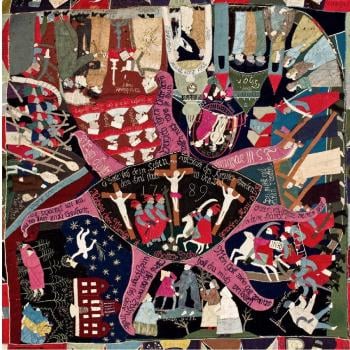
In the first few centuries of Christian history, Christians were the outsiders, often looked upon with great suspicion, renegades worth of execution. The derision they faced was founded, in part, on gossip, where it was speculated, for example, that Christians were amoral libertines, engaged in orgies during their so-called “love-feasts,” while the product of their unions was said to be killed in infancy and fed to them during those same feasts. We find this, for example, in the opening sections of the dialogue Octavius by Minucius Felix, in which a pagan critic gives his typical understanding of the errors of Christianity:
Now the story about the initiation of young novices is as much to be detested as it is well known. An infant covered over with meal, that it may deceive the unwary, is placed before him who is to be stained with their rites: this infant is slain by the young pupil, who has been urged on as if to harmless blows on the surface of the meal, with dark and secret wounds. Thirstily— O horror!— they lick up its blood; eagerly they divide its limbs. By this victim they are pledged together; with this consciousness of wickedness they are covenanted to mutual silence. Such sacred rites as these are more foul than any sacrileges. And of their banqueting it is well known all men speak of it everywhere; even the speech of our Cirtensian testifies to it. On a solemn day they assemble at the feast, with all their children, sisters, mothers, people of every sex and of every age. There, after much feasting, when the fellowship has grown warm, and the fervour of incestuous lust has grown hot with drunkenness, a dog that has been tied to the chandelier is provoked, by throwing a small piece of offal beyond the length of a line by which he is bound, to rush and spring; and thus the conscious light being overturned and extinguished in the shameless darkness, the connections of abominable lust involve them in the uncertainty of fate. Although not all in fact, yet in consciousness all are alike incestuous, since by the desire of all of them everything is sought for which can happen in the act of each individual.[1]
Christians, moreover, were seen to be unpatriotic. Not only did they repudiate traditional religion, mocking the gods which the pagans believed gave Rome her great destiny and fortune in the world, they were unwilling to stand up for Caesar and give him the basic modicum of respect due to him and to Rome by offering sacrifices to him. Many Christians were said to be unwilling to follow their duty to the state and take up arms if and when Caesar asked for their help, proving that they were traitors, waiting for the overthrow of the state. And if their disrespect to the gods were not punished, it was believed that the gods could and would punish Rome. Celsus, an educated critic who had done some study of Jewish and Christian writings and therefore did not accept all the gossip spoken out against Christians nonetheless believed Christianity was mostly a religion of the lower, uneducated classes easily led astray by self-contradictory religious texts. When reading his text, it is quite apparent, a major reason for his argument was his concern with the way Christians seemed to interfere with Rome, hurting it from within because of they lacked the virtue of patriotism and so neglected their civic duties:
Indeed, it is only insanity for the Christians to refuse their religious duties, rushing headlong to offend the emperor and the governors and to invite their wrath. To love the emperor and serve God are complementary duties: if one worships God, he will not be influenced by those who command him to utter blasphemies or to whisper seditious things about the authorities. [2]
And so, Celsus continued, the outcome is easily discerned:
If everyone were to adopt the Christian’s attitude, moreover, there would be no rule of law: the legitimate authority would be abandoned; earthly things would return to chaos and come into the hands of the lawless and savage barbarians; and nothing further would be heard of Christian worship or of wisdom, anywhere in the world. (Indeed, even for your superstition to persist, the power of the emperor is necessary).[3]
Finally, Celsus made it as clear as he could:
We are citizens of a particular empire with a particular set of laws, and it behooves the Christians at least to recognize their duties within the present context; namely, to help the emperor in his mission to provide for the common good; to cooperate with him in what is right and to fight for him if it becomes necessary, as though we were all soldiers or fellow generals. [4]
It was not just Celsus who rejected Christianity because of its relationship with the state.













